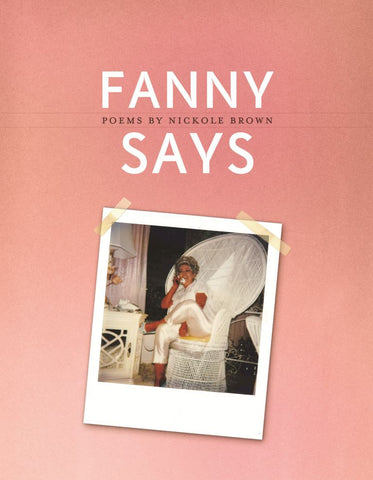
About This Title
Winner of a 2015 Weatherford Award
San Francisco Chronicle Best Poetry Book of 2015
Library Journal Best Book of 2015
New Pages Editor’s Pick for 2015
An “unleashed love song” to her late grandmother, Nickole Brown’s collection brings her brassy, bawdy, tough-as-new-rope grandmother to life. With hair teased to Jesus, mile-long false eyelashes, and a white Cadillac Eldorado with atomic-red leather seats, Fanny is not your typical granny rocking in a chair. Instead, think of a character that looks a lot like Eva Gabor in Green Acres, but darkened with a shadow of Flannery O’Connor. A cross-genre collection that reads like a novel, this book is both a collection of oral history and a lyrical and moving biography that wrestles with the complexities of the South, including poverty, racism, and domestic violence.
“Fanny Linguistics: Superstition”
In Fanny’s house, there were ways of killing
someone by walking alone: I could step over
my youngest uncle sprawled watching TV,
could step over his boy heart or leg or arm—
it wouldn’t matter which— because unless you step back
over him, tight quick, by morning he’ll be
gone.
Same goes for a bird let in the house— a sparrow
in the laundry room had wings
Of the Great Scythe, and a black crow
tangled in the living room curtains could well wipe
the whole family out. And should you dream
of losing your teeth— that meant death
coming sure as an owl shits
tiny bones of mice in the middle of the night;
it was a full-on omen, start baking
the funeral casseroles now.
Funny, all that hoo-doo about dying with no intent
to remember the dead— how Fanny hated photographs:
I don’t take pictures, She said. It just makes me sad,
and if anything ever did happen
to one of the kids, I don’t want to be left
staring at their face.
Praise for Fanny Says
“Nickole Brown’s unleashed love song to her grandmother is raucous and heart-rending, reflective and slap-yo-damn-knee hilarious, a heady meld of lyrical line and life lesson. Brown is blessed to be blood-linked to such a shrewd and singular soul, and the poet’s mix of monologue, myth, and unbridled mayhem paints a picture of a proper Southern lady who is just-well, unforgettable.”—Patricia Smith
“In Fanny Says, Nickole Brown distills the whole of America into one woman: bawdy, loving, racist, battered, healed, and gorgeous with determination. Our country has no history that does not touch the South. Our divisions are our unions. Here, Brown unleashes a voice returned to teach us a lesson. Reader, fair warning: you can’t hide from Fanny. You will be changed by this book.”—Rebecca Gayle Howell
“Brown’s sprawling sophomore collection is a lyrical biography of and tribute to her wise and irreverent southern grandmother. Along with a memorable lesson in the use of the word ‘flitter,’ what’ll stick most is this book’s unknown ‘word for all things left unbroken, a word for breakable yet unbroken things.’”—NPR Books
“In a voice that is both authentic and colloquial, Brown tells the story, without sentimentality or cliché, of her grandmother Fanny. . . . It’s rare to find a book of poems that reads like a well-plotted page-turner, each poem propelling the reader into the next, each poem filled with story and song. This is that book. VERDICT: Bawdy and real, this volume will stay with readers long after Fanny has had her final say.”—Library Journal, Starred Review
“Brown’s depiction of her cussing, pill-popping grandmother Fanny, who wears push-up brassieres along with starched, short-sleeved men’s ‘business’ shirts, is poignant, funny, and utterly real. Fanny’s tone and inflection come alive through the series of poems based on her actual words. And through Brown’s vivid, honest, and surprisingly nonjudgmental reflections, we develop, page by page, a mental image of her grandmother in the mid-twentieth-century South and can’t help but enjoy the process of getting to know Frances Lee Cox. While this collection honors Fanny’s span of years on this planet and her impact on her granddaughter, it also showcases the writer’s humor, insight, and poetic gifts.”—Booklist
“This is a commentary on the South as a whole. . . . Fanny Says remains a tender character study above all else. I wouldn’t be surprised to see a film adapted from this. It endures sentiment and challenges social notions. It is true to humanity and breathed with life.”—NewPages
“Nickole Brown has written an epic poem called Fanny Says. . . . It is in essence one long poem—138 pages—chambered like a heart and pumping language like blood to every stanza throughout this single, vital organ. Though Brown has written these words down, the oracular qualities of her grandmother, Frances Lee Cox—her distinctive way of speaking, idioms and regionalisms, malapropisms and profanities all—manifests so entirely that the reader is not really reading but listening as this monumental, multi-generational narrative unfolds.”—The Rumpus
“Many of us find it difficult to tell our family stories—no surprise, as they are usually loaded. One of the accomplishments of Fanny Says is its skillful and unapologetic confrontation of the shamelessness of Brown’s people—and sometimes ours. . . . Here Brown is at her best—writing calamity with eloquence, speaking, in the same moment, Fanny’s complications and the poet’s claim on it. This book, like a grandmother’s love, is not always pretty, but it pulls you in and gives you so much truth.”—Oxford American Magazine
“Brown blends descriptions of the immensely wise, brazen and sailor-mouthed Fanny with ruminations on both the power of memory and the Kentucky culture that surrounded them both. The editorial assistant for the late Hunter S. Thompson, the fabric of Brown’s poems share threads of his deeply honest and personal reporting, but Fanny Says proves that she’s a literary heavyweight in a class of her own.”—BookPage
“Fanny Says delights and dazzles at every turn. In these poems, Brown finds the space and time to explore her own family and the South as an imagined location. In the tradition of great lesbian writers such as Dorothy Allison, Fannie Flagg, June Arnold and Rita Mae Brown, Nickole Brown spins a yarn that is at once fantastical and believable, one that leaves us, as readers, yearning for more.”—Lambda Literary
“Reading Nickole Brown’s new book of poems, Fanny Says, is like being introduced to someone you never want to let go, the kind of fierce, tender, acerbic, complicated woman who will snag you by your scruff and tell you what you don’t want to hear, and—in the next breath—what you need to hear.”—Gwarlingo
“Nickole Brown first established herself as a major talent with her 2007 novel in poems, Sister, and Fanny Says marks a further development in Brown’s exploration of what a poetry collection can be and do. . . . This book explores Fanny in all her troubled humanity, and confronts domestic violence, racism, and poverty in the American South.”—Tahoma Literary Review
Publication Date: April 14, 2015
ISBN: ISBN: 978-1-938160-57-8
© BOA Editions, Ltd. 2015

